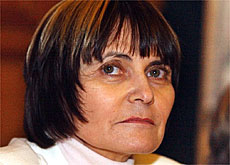
Key players wavering on Swiss aid conference

A humanitarian conference on Iraq organised by the Swiss government is facing a no-show by key players a week before it is due start.
Iraq was not invited and key participants, such as the United States, have suggested they may not attend.
“How can they not invite Iraq, when the conference is about what the humanitarian consequences would be in Iraq after a military attack?” Samir Al-Nima, Iraq’s UN ambassador, told swissinfo.
The Swiss foreign minister, Micheline Calmy-Rey, on Friday justified the decision, saying Iraq had not been invited because the SDC wanted to avoid turning the conference into a political event.
She stressed the meeting – scheduled for Feb 15 and 16 in Geneva – would be composed of experts who would confine their discussions “to practical questions for humanitarian relief in Iraq in the event that the crisis breaks out into open hostilities”.
“Humanitarian issues have got nothing to do with politics,” said Calmy-Rey. “We must do everything we possibly can on the humanitarian side before, during and after a possible war.”
Negative reaction
At a press conference in Bern, Calmy-Rey said the list of those attending would be released next Tuesday, but admitted that the US had “reacted negatively” to the invitation.
For its part, the US embassy in Bern refused to comment on whether it would be sending a representative.
The International Committee of the Red Cross told swissinfo it had yet to confirm its attendance, as did the UN refugee agency and Unicef.
“We are currently assessing our participation in the conference,” ICRC spokeswoman, Nada Doumani, told swissinfo. “We think it’s a little bit problematic that Iraq, as the country which is primarily concerned with the conference, won’t be present.”
“If Iraq and the United States do not participate, the relevance of this meeting is called into question. But our decision on whether to participate will not be based solely on which countries are participating. However, these are elements that will be taken into account.”
Calmy-Rey insisted the meeting would go ahead, even without the US, and indicated that she had received “positive reactions” from other invitees.
Mistake
She dismissed suggestions that it had been a mistake to publicise the conference before key details – such as who would attend – had been settled. She said time was short and the key humanitarian issues needed to be discussed.
Toni Frisch of the Swiss Agency for Development and Cooperation, which is organizing the conference, said Iraq would be informed of the “decisions made at the meeting and we will also try to get them to participate indirectly”.
“We have to find the best way to work under these given circumstances, which we often don’t choose ourselves,” he told swissinfo.
Under pressure
Correspondents say Calmy-Rey was likely to have come under pressure to exclude Iraq from her cabinet colleagues and other potential attendees who may have objected to Iraq’s presence.
Within Switzerland, Calmy-Rey – who has only been in the job since January 1 – has been criticised for not informing her cabinet colleagues about her plans for a meeting before making them public.
The rightwing Swiss People’s Party called on the government to restrain Calmy-Rey, who belongs to the centre-left Social Democrats, before she did any more damage to the country’s external relations.
The president of the centre-right Christian Democratic Party, Philippe Stähelin, questioned her judgement in publicising the conference before the details had been finalised.
The SDC admitted after announcing the conference on Monday that invitations had not been sent out. They were finally dispatched on Wednesday to 45 countries and humanitarian organisations.
swissinfo, Jonas Hughes
Some 16 million Iraqis – 60 per cent of the population – are entirely dependent on the government for basic essentials, such as food.
A quarter of children under the age of five suffer from malnutrition, Unicef estimates.
Food is one of the main humanitarian concerns, with rations already said to be running short.
Aid agencies warn that the bombing of power stations could destroy water and sewage systems leading to catastrophe.
The Swiss said Iraq was excluded to avoid turning the meeting into a political event.
Several key humanitarian agencies, including the ICRC and Unicef have yet to confirm their attendance.
Both aid agencies and local political figures have expressed doubts about the way the conference was organised.

In compliance with the JTI standards
More: SWI swissinfo.ch certified by the Journalism Trust Initiative

























You can find an overview of ongoing debates with our journalists here . Please join us!
If you want to start a conversation about a topic raised in this article or want to report factual errors, email us at english@swissinfo.ch.